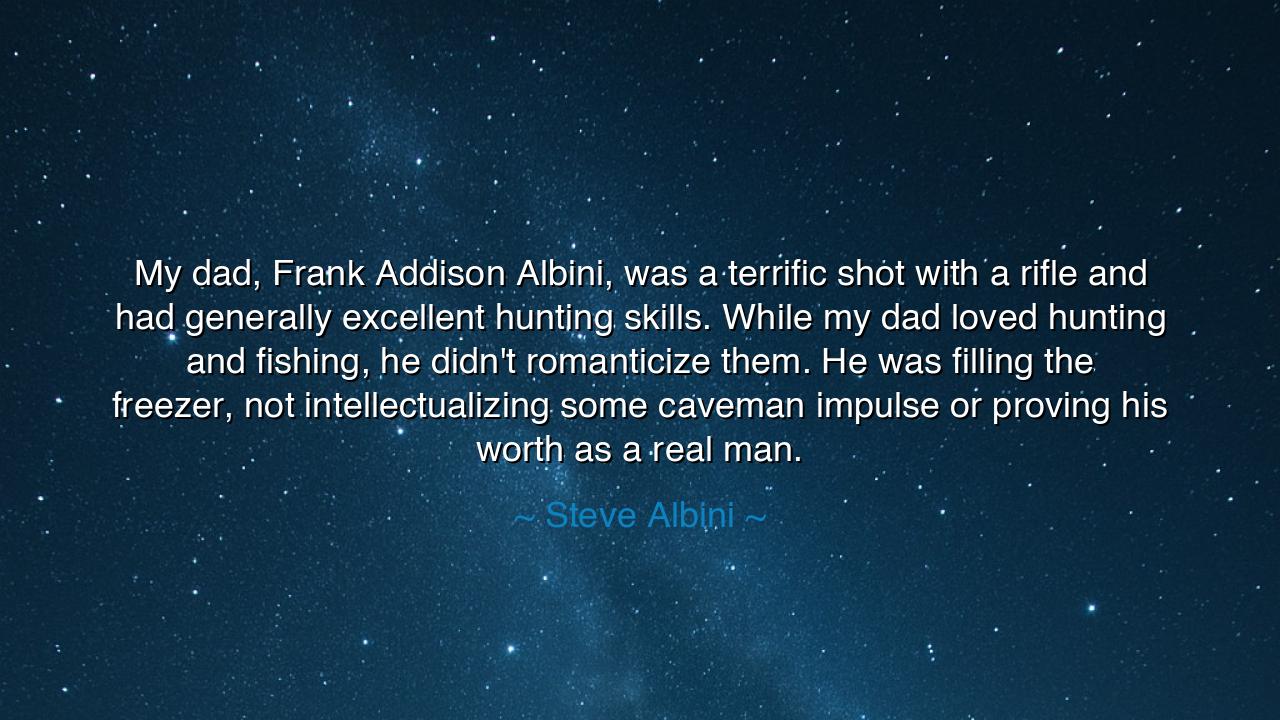
My dad, Frank Addison Albini, was a terrific shot with a rifle
My dad, Frank Addison Albini, was a terrific shot with a rifle and had generally excellent hunting skills. While my dad loved hunting and fishing, he didn't romanticize them. He was filling the freezer, not intellectualizing some caveman impulse or proving his worth as a real man.






“My dad, Frank Addison Albini, was a terrific shot with a rifle and had generally excellent hunting skills. While my dad loved hunting and fishing, he didn’t romanticize them. He was filling the freezer, not intellectualizing some caveman impulse or proving his worth as a real man.” — Steve Albini.
In these plain yet profound words, Steve Albini pays tribute not only to his father, but to an entire philosophy of life — the quiet dignity of purpose over pretense, of humility over display. His father, Frank Addison Albini, hunted not for glory, not for spectacle, but for necessity. His skill was real, his aim sure, his reason simple: to provide. There is no vanity in this, no myth of masculinity wrapped in blood or conquest. In a time when men often seek identity in symbols of power, Steve’s remembrance of his father speaks of a nobler strength — the kind that needs no witness, no applause, only integrity.
The origin of this quote lies in Albini’s reflection on his father’s life and character — a man of the old world, where action spoke louder than philosophy. Frank Albini belonged to a generation that did not dress virtue in eloquence. They lived by it. They understood that work, skill, and provision were not performances but obligations, done not for pride but for the quiet rhythm of survival and care. Hunting and fishing, in this light, were not rituals of dominance or self-definition, but acts of stewardship — of living in balance with the earth and providing for one’s kin.
There is deep ancient wisdom in this way of being. The great civilizations of the past revered those who acted without vanity. The Roman farmer-soldier, who tilled the land by day and defended it when called, did not consider his labor poetic — yet it was sacred. The Spartan, though trained for war, did not glorify killing, but discipline. And the Taoist sage taught that the highest virtue is that which acts without seeking recognition. Frank Albini, in his simple, unromantic relationship with nature, stood within this lineage of the quiet strong — those who live meaningfully without declaring meaning.
How different this is from the modern world, where even simplicity is often performed for admiration. Today, men boast of their labor, intellectualize their instincts, and turn every act into a stage. But Frank Albini’s way was older, purer — the way of the craftsman, the provider, the father who works unseen. He did not “prove his worth as a real man” because he did not doubt it. His manhood was not a question to be answered by ritual or rebellion. It was proven each day, in the steady provision of food, in the respect for nature’s cycles, in the love for his family expressed through action, not talk.
In this story, we see a reflection of the ancient heroism of the ordinary. For greatness does not always roar from the battlefield or the throne. Sometimes it hums in the rhythm of a man’s daily work — in the unspoken code of duty, moderation, and humility. Frank Albini reminds us that nobility is not found in self-importance but in usefulness, not in the poetry of the act but in its necessity. He did not romanticize his labor because he did not need to. He was already living the essence of what others merely speak about.
Consider, too, the story of Cincinnatus, the Roman statesman called from his plow to save the Republic. He led Rome to victory, and when the crisis ended, he returned to his farm without asking for reward or glory. His greatness lay not in ambition but in simplicity — the same spirit that guided Albini’s father. Both men understood that to do what must be done without vanity is the highest form of virtue. They remind us that the truest power is self-contained, quiet, and rooted in necessity, not ego.
And so, the lesson unfolds like a whisper from the past: Do not seek meaning through display. Live your meaning through purpose. Let your work speak for you. Whether you build, teach, hunt, or heal — do it not for praise but because it must be done. Respect the earth, your craft, your duty, and your family. In an age where people hunger for identity, remember Frank Albini’s wisdom, embodied in his son’s words — that worth is not proven, it is lived. The freezer full of food, the family fed, the task done well — these are the silent emblems of greatness.
Thus, let us honor those who live quietly but powerfully — those who, like Frank Addison Albini, understand that true strength lies not in noise but in purpose fulfilled. For one day, when our own words are remembered, may they carry the same truth — that we worked with care, gave with honesty, and sought no glory but the dignity of having done what was right.






AAdministratorAdministrator
Welcome, honored guests. Please leave a comment, we will respond soon